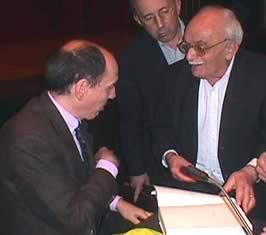On Thursday, 8 May 2003 the Goethe Institute and the International Raoul Wallenberg Foundation jointly organized the debate ”Argentina and the Nazis”.
The initiative is the first of a series of presentations that the Wallenberg Foundation is planning to organize in several cities of the world with the aim of clarifying one of the darkest chapters of the Argentine foreign policy: the one referred to the relations between the Argentine State and the Nazi war criminals.
With that purpose, a distinguished board of specialists on the subject gathered at the auditorium of the Goethe Institute, in the city of Buenos Aires, willing to not only express their points of view but to also exchange impressions and information with the audience.
Uki Goñi, writer, author of the book ”The Real Odessa”; Dr. Carlota Jäckisch, senior researcher for the Friedrich von Hayak Foundation and Lic. Beatriz Gurevich, one of the most renowned authorities in the world on the subject and author of the two-volume work ”Project Testimony” were present.
Dr Rudolf Barth, Director of the Goethe-Institut, welcome the attendance of more than 150 people. Gustavo Jalife, Executive Director of the Wallenberg Foundation, moderator of the debate, presented the program and the panelists.
In his exposition, Uki Goñi emphasized the numerous difficulties he had to face in order to have access to the documents kept in the Argentine official archives. After his short period in the Commission of Enquiry into the Activities of Nazism in Argentina (CEANA), founded by former Minister of Foreign Affairs, Guido Di Tella, he resigned due to irreconcilable differences of criteria with the academic authorities. He started then, a difficult but productive task as independent researcher. Goñi stated that. in spite of the multiple obstacles set by officials belonging to different dependencies of the Argentine State, such as the National Direction of Migrations, he was able to write two revealing books by having access to that information in files of the United States, Great Britain and other European countries: ”Peron and the Germans”, (Sudamericana, 1998) and ”The Real Odessa” (Granta Books, London, 2002); the latter published in Spanish as ”La Auténtica Odessa”.
The documents denied to Goñi and to other academic institutions as well as NGOs, have been object of a note published in The New York Times, and of investigations of the US Congress and the Argentine Parliament.
Carlota Jäckisch, told the audience the results of her investigation for CEANA about the quantification of Nazi war criminals according to Argentine sources, with an amount of 180 criminals who arrived Argentina between 1946 y and the mid fifties.
Beatriz Gurevich exposition was based on the answers of the Argentine State and the requests of extradition of the war criminals Pierre Daye and Ante Pavelic. Gurevich stressed the arbitrary answers given to the requests of extradition and the paralegal mechanisms of extradition that went through the granting of the immigration permits.
At the end of the expositions an intense debate started with the audience, which extended the activity for two hours. Among the numerous questions it is worth mentioning the ones related to the luck of the Argentine Jews in the Third Reich, a not very well known chapter in the history of the Holocaust until the appearance of Goñi’s book.
It greatly surprised the information about the fate of a hundred Argentines who died in the extermination camps abandoned by the Argentine authorities, in spite of the efforts of top rank Nazi authorities to try to save their lives. The news, developed by Goñi in Chapter four of ”The Real Odessa”, had been revealed to the people by the Wallenberg Foundation in articles that appeared in the year 2002 in Página/12 and Buenos Aires Herald newspapers.

